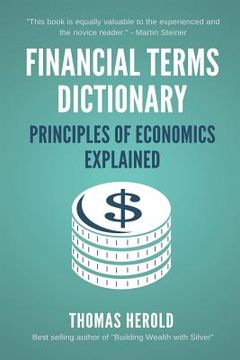Compartir
Financial Terms Dictionary - Principles of Economics Explained (en Inglés)
Thomas Herold
(Autor)
·
Wesley Crowder
(Autor)
·
Independently Published
· Tapa Blanda
Financial Terms Dictionary - Principles of Economics Explained (en Inglés) - Crowder, Wesley ; Herold, Thomas
$ 19.670
$ 39.330
Ahorras: $ 19.660
Elige la lista en la que quieres agregar tu producto o crea una nueva lista
✓ Producto agregado correctamente a la lista de deseos.
Ir a Mis Listas
Origen: Estados Unidos
(Costos de importación incluídos en el precio)
Se enviará desde nuestra bodega entre el
Viernes 07 de Junio y el
Miércoles 19 de Junio.
Lo recibirás en cualquier lugar de Chile entre 1 y 3 días hábiles luego del envío.
Reseña del libro "Financial Terms Dictionary - Principles of Economics Explained (en Inglés)"
Make Better Financial Decisions - Understand Economic Terms This practical financial dictionary for Economics terms helps you understand and comprehend most common economics lingo. It was written with an emphasis to quickly grasp the context without using jargon. Each of the 442 economic term is explained in detail and also gives practical examples. It is based on common usage as practiced by financial professionals. Compiled over the last 3 years from questions and feedback to financial articles published by the Wealth Building Course education program. Economics 101 This book is useful if you are new to business and finance. It includes most economic terms for businesses, investors and entrepreneurs. It also covers the lingo that was introduced in the financial crisis of 2008 until 2017. With the alphabetical order it makes it quick and easy to find what you are looking for. Financial Dictionary Series Additional financial dictionaries are available in this series. Please also check out: Accounting, Banking, Retirement, Corporate Finance, Investments, Laws & Regulations, Acronyms, Real Estate & Trading. Click on the author name to see them. Example: What is Market Sentiment? Market sentiment refers to the all around attitude investors have with regards to a certain financial market or specific security. It is the tone and feeling in a market. This is displayed via the price movement and activity of various securities which trade in a given market. Some have called it the market crowd psychology or investor sentiment. Rising prices in a market are indicative of bullish market sentiment, while declining prices indicate the sentiment in a market is bearish. What makes market sentiment so interesting is that it is sometimes not based on the underlying fundamentals of the security or market in question. At times it instead is based on emotion and greed rather than actual business valuations and fundamentals. This market sentiment matters immensely to both technical analysts and to day traders. These individuals read technical indicators in order to measure shorter term price movements which the attitudes of investors can cause in a given security. They attempt to profit from these price fluctuations. Such sentiment also is important for contrarian investors. They prefer to place trades in the opposite direction of any prevailing sentiment. When all other investors are buying, a contrarian will use this sentiment to instead sell. In general, market sentiment is referred to as either bullish or bearish. As the bulls have control, the stock prices are running up and away. As the bears are dominant, prices of stocks are declining or even plunging. Since the markets are subject to and driven from the emotion of the collective traders, the sentiment of the markets is often not correlated to the underlying fundamental values. This means that market sentiment is more about group emotions and feelings while the fundamental value is more about the actual business performance. Traders realize profits when they find those stocks which are either undervalued or overvalued because of their market sentiment. Traders and investors alike utilize different indicators to attempt to ascertain what the sentiment of the markets actually is. This helps them to decide which stocks are the best ones for them to trade. There are a number of these helpful indicators. Among the more popular ones are the following: VIX CBOE Volatility Index, Bullish Percentage, 52 Weeks High to Low Sentiment Ratio, 200 Days Moving Average, and 50 Days Moving Average. Note: This example description is shorted due to publish restrictions. Each term is explained with 600 words and more.
- 0% (0)
- 0% (0)
- 0% (0)
- 0% (0)
- 0% (0)
Todos los libros de nuestro catálogo son Originales.
El libro está escrito en Inglés.
La encuadernación de esta edición es Tapa Blanda.
✓ Producto agregado correctamente al carro, Ir a Pagar.

